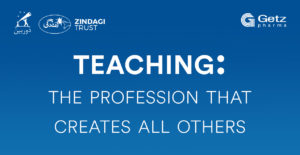
Teachers are our nation builders. They prepare the future generations with the necessary skills and knowledge that can assist them in achieving academic and professional excellence. In Pakistan, the education system lacks well-trained teachers, hindering students’ growth and learning opportunities.
As part of our CSR goals, we support initiatives that promote education, especially for the underprivileged. Since its inception, Getz Pharma has extended financial and technical support to educational institutions and non-profit organizations such as Durbeen and Zindagi Trust. Durbeen was established with the long-term goal of improving public schools in Pakistan. In 2019, Durbeen signed a public-private partnership agreement with the Government of Sindh to manage one of the oldest teacher training institutes in the region, the Government Elementary College of Education (GECE) in Karachi. Zindagi Trust is committed to changing Pakistan’s academic framework through school reform projects. The organization has revamped several government schools by upgrading its infrastructure, curriculum, teacher professional development, and academic governance.
In observance of the International Day of Education, Getz Pharma organized a panel discussion in collaboration with Durbeen and Zindagi Trust to discuss the topic ‘Teaching: The Profession That Creates All Others.’ The panelists at the session included Shehzad Roy, Musician, Activist, Founder, and President of Zindagi Trust, Rana Hussain, Principal of Ziauddin University’s College of Education, Dr. Fouzia Naeem Khan, Chief Advisor, Curriculum Wing, Sindh School Education & Literacy, and Khalid Mahmood, CEO & Managing Director of Getz Pharma. Salma Alam, CEO of Durbeen, moderated the session.
Salma Alam began the discussion by shedding light on the present situation of Pakistan’s education system with the audience. She shared a recent study of government teacher education institutions that reveals that most institutions lack basic facilities, laboratories, libraries, transport, and competent teaching faculty. The study also highlighted a decline in applicants for teacher training programs; in most cases, admission in teacher training programs was not the applicant’s first choice. As a result, students opting to become teachers possess a low standard of education.
Additionally, according to Sindh’s teacher recruitment 2021, out of 162,000 candidates that appeared in September of last year, only 150 managed to pass. Sindh’s requirement was 46,000 teachers at that time. Every year, Sindh requires 7000 new teachers. However, it can never find enough B.ED qualified teachers when the government hires. As a result, it lowers admission criteria to allow all degree holders to apply, hurting the profession’s prestige. Hence, all incoming teachers need to have a B.Ed. degree.

Here are key takeaways from the discussion:
Dr. Fouzia Naeem Khan
Dr. Fauzia stressed the importance of having a B.ED degree requirement for all teachers. Each profession requires a specific set of skills and qualifications, and the same is the case for teachings. It is encouraged for people with Master’s and Bachelor’s degrees to join the teaching profession, but they must be given foundation courses, which can prepare them with the necessary skill sets required in the classroom. Moreover, she also added that a proper personality assessment test needs to be taken before hiring teachers.
Rana Hussain
Ms. Rana pointed out that delivery of the curriculum is as important as developing the curriculum. Moreover, she mentioned two essential levers that can improve the education system. The first lever is to build the capacity of teacher educators, who are the backbone of the entire quality program. The second important lever is that universities and colleges where the program is housed must be equipped with proper infrastructures such as IT-related resources and access to different international books. There is still a notion of preparing a teacher with the help of a textbook, disregarding the fact that we are developing teachers for this century. Hence, lecturers must become technologically advanced to bridge the information gap. Existing teachers should be enrolled in the one-year B.Ed. Program so we can have a fast-tracked teacher education.
Khalid Mahmood
A paradigm has been set for the education system in developed countries, where students from low-income areas have equal access to quality education, resources, and facilities. During his travels to developed countries, he observed that public schools were well taken care of by teachers and equipped with basic amenities. On the contrary, an inadequate amount of GDP is being spent on education in Pakistan. Expenditure in primary education has seen a downward shift even though higher education is built on the foundation of primary and secondary education systems. He also mentioned that in his 35-year-old career, he had seen a decline in the quality of personnel, and this stems from poor quality education being provided to students. As a result, graduates lack the skills, such as critical thinking and the competitive spirit required to excel in their job roles.
Shehzad Roy
While teaching is a noble profession, it is also a science, and for individuals to become educators, they need proper training and qualification. It is the government’s responsibility to uplift the prestige of the teaching profession. Moreover, Public-Private Partnership in Education can result in better learning outcomes. The current curriculum imparts knowledge and instills cognitive thinking in students but has no link to the industry. As a result, students are not prepared for the job market.
In addition to deciphering the challenges of the present education system, the panel also addressed questions from the audience.
Watch the complete session to learn more about this topic by clicking on this link.
Speaker profiles:
Shehzad Roy is a Pakistani Musician, Activist, Founder, and President of Zindagi Trust – a non-profit organization striving to reform the education system in government schools. He received Tamgha-i-Imtiaz in 2005, Sitara-i-Eisaar in 2006 for his relief efforts in the Kashmir earthquake. In 2013, the National Assembly passed a law criminalizing corporal punishment based on the petition submitted by his organization. In 2018, he received the Sitara-e-Imtiaz for his work in education reform through advocacy, especially to integrate Child Protection into the provincial curriculum of Sindh. In 2021, the Sindh government approved a new teacher performance evaluation format established by Zindagi Trust for public school teachers across the province.
Rana Hussain is currently serving as the principal of Ziauddin University’s College of Education. She has also served as the Curriculum Director of the U.S. Agency for International Development & Higher Education Commission Teacher Education Programme, PreSTEP, in 2009 through which Pakistan’s 4-year B.Ed. Degree program was developed.
Dr. Fouzia Naeem Khan is a Ph.D. (Professional Psychology) and DIP (Clinical Psychology) Student of Education and Psychology. She has over twenty years of experience in managing development programs and projects that have been cited as effective, innovative, and responsive to the community’s needs. Dr. Fouzia Khan is an avid researcher and practitioner whose career and interests reflect her devotion and commitment to the field of development. She is a member of multiple academic and non-academic organizations. She is a Member of Executive Committee of the Science Talent Farming Scheme, Pakistan Science Foundation, the National Curriculum Council, the National Steering Committee – (GEF SGP UNDP, Pakistan) & the National Steering Committee – (Child Protection, UNICEF). Dr. Khan is the Provincial Focal Person – National Education Policy, National Curriculum Framework & SDG’4. She is currently serving as the Chief Advisor-Curriculum Wing, and Additional Director (ECCE), with the School of Education & Literacy Department, Government of Sindh. She is also the SELD focal person for Gender, Nutrition, WASH, SDGs. She is an author of various research papers published in Pakistan’s International Repute Research Journals. She also supervises MS, MPhil, and Ph.D. candidates of different universities in Pakistan.
Khalid Mahmood is the Managing Director and CEO of Getz Pharma. He is a 35-year veteran of the healthcare & pharmaceutical industry. He has worked for over 14 years in progressively responsible positions in the pharmaceutical and primary health care industry in the U.S., Far East, and the Asia Pacific. He holds an MBA in marketing from Rutgers University & a B.S. degree in Industrial Engineering from California State University, USA. He has served as the president of the board of directors of WWF Pakistan and is currently on the board of Zindagi Trust. He is Chairman of the Board of Trustees of T2F and is also on the Eqbal Ahmed Center for Education board.
Moderator:
Salma Alam is the CEO of Durbeen – a non-profit organization established to improve public schools in Pakistan. She is qualified as a primary school teacher from Singapore. Salma started her education career at the S.M.B. Fatima Jinnah government school in Karachi, where she volunteered with Zindagi Trust for four years. After graduating from Harvard University, Salma spent two years consulting with the World Bank. She developed and supervised a Human Resource Management Information System project for Sindh School Education Department employees.
You are about to be redirected to an online retailer’s website. Getz Pharma is not liable for any data exchange on the new website
You will be redirected in 3secs
Disclaimer: "This message (including attachment) is intended solely for the use of the individual or entity whom it is addressed and may contain information that is confidential or privileged. If you are not the intended recipient of this message, you are hereby notified that any use, dissemination, distribution or reproduction of this message is prohibited and that, you must not take any action in reliance on it. E-mail transmission cannot be guaranteed to be secure or error-free as information could be intercepted, corrupted, lost, destroyed, arrived incomplete or contain viruses; therefore Getz Pharma (Private) Limited cannot accept legal responsibility for the contents of this message. If you have received this communication in error, please notify the sender or Getz Pharma (Private) Limited at [email protected] immediately and destroy the original message."
Close